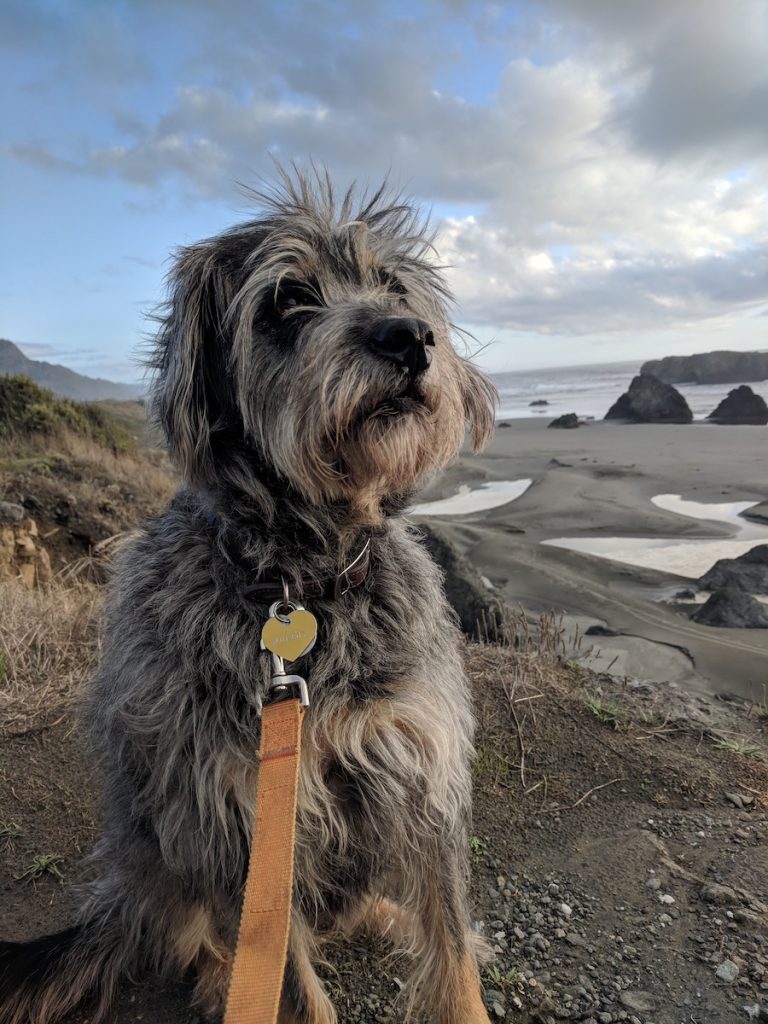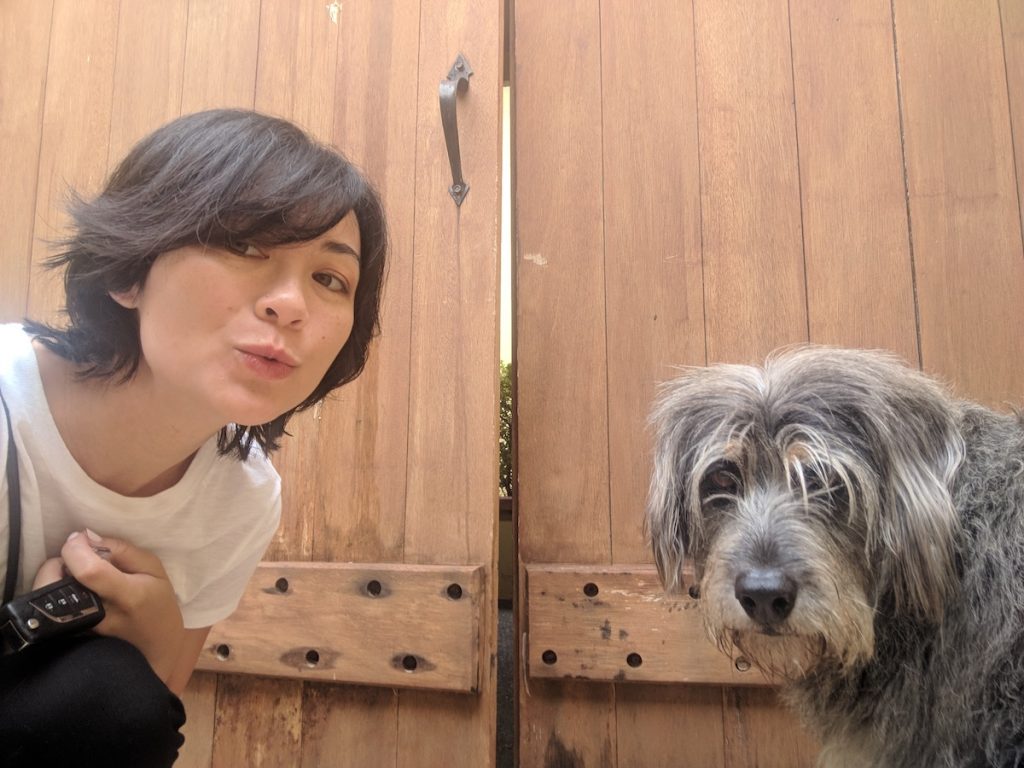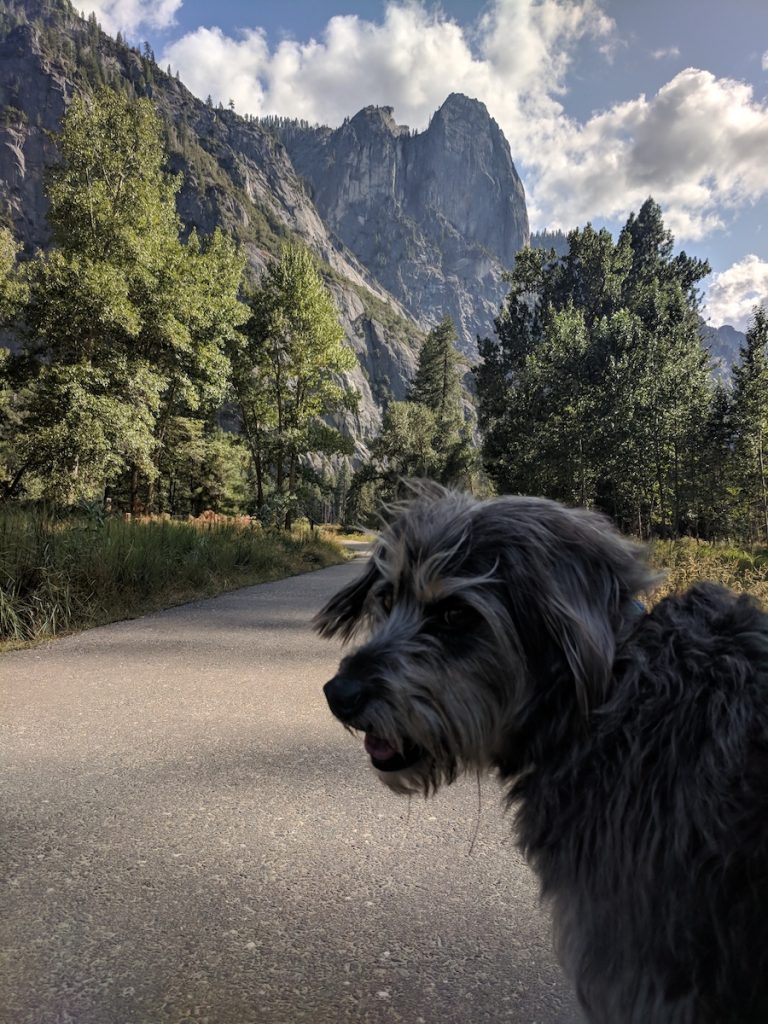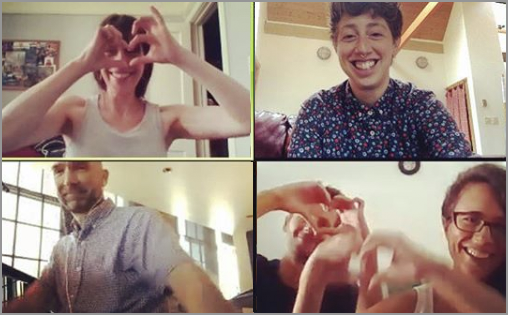Last fall, my dog Murphy and I took a road trip along the Oregon coast into California. After miles of driving through dense forest on either side of us, I finally caught a glimpse of the wet, shiny, rocky horizon. The forest seemed to grow straight into the ocean—all I could see was mountain, trees, and water. We pulled over, and while Murphy furiously sniffed the saltwater air, I couldn’t bring myself to do anything but stare at the vastness in front of me. I felt insignificant in a weirdly satisfying way. It’s a memory I return to often, especially during stressful times. Which, in 2020, has been frequently.
The satisfying, insignificant feeling I felt was awe—what research psychologists refer to as the “small self” effect. A 2007 study explained awe as a “feeling of smallness, being in the presence of something greater than the self, inattention to one’s personal day-to-day concerns, connection with the surrounding world, and wanting to prolong or memorize the experience.”

You’ve probably experienced this, too. Maybe you felt it during a trip to the Grand Canyon. Or looking at a piece of art. Or reading a mind-blowing book. Maybe you saw the cracks and craters of the moon’s surface through a telescope and felt awe then. Awe is a powerful feeling that extends far beyond the amazement we experience in the moment. For example, awe offers a sense of perspective that can help us see things more objectively.
In one study, when subjects experienced awe, they were less likely to be persuaded by weak arguments. Another study found that awe makes people less prone to materialism. In yet another study—there’s a lot of research on awe—subjects were either asked to spend time in a regular hallway or in front of an awe-inducing T-rex skeleton. Berkeley’s Greater Good Magazine explains what happened next:
When asked to describe themselves, the dinosaur viewers were more likely to use universal descriptors (such as “a person” or “an inhabitant of the Earth”) rather than more specific descriptors (such as “tall,” “friendly,” or “a student”) than the other people, suggesting that awe increases our sense that we are part of a greater whole.
You get it—awe is, well, awesome. It makes us more connected, happier, sharper—it also allows us to experience time in a more present way. And imagine what all of that can do for your creative pursuits!
During my road trip with Murphy, I attended Everything Conference, where I met so many creative and interesting people, including Charlie Gilkey, author of Start Finishing. I asked Charlie if I could interview him for an article I wanted to write about unfinished projects, and while that was true, selfishly, I also wanted to get his insight on my own unfinished project.
I’d been stuck on an essay I wanted to write. It was a heavy, personal topic and when I would start to write about it, self-doubt and vulnerability would become overwhelming and I couldn’t manage to put a single word on the page. What if my approach was wrong? What if my writing was bad? What if someone rolled their eyes at it? These are all distinct possibilities in writing anything, but this essay was personal. I couldn’t bear to have something so intimate be scrutinized. “Maybe don’t worry about the ending,” Charlie said. “Don’t think about where it’s going to be published or who’s going to read it. Just write it for yourself and worry about the rest later.”
I kept this advice in my back pocket, then I packed my bags and left Portland to drive home to California. I rolled down the back window and Murphy stuck her nose in the air. I blared music and sang along to it, loudly. I drove down the Oregon coast, listening to books and podcasts along the way and stopping frequently to take in the incredible scenery. It’s a road trip I’ll never forget—it was ten days of allowing myself to experience awe. I honestly still dream about it, months later.

During the last night of our trip, Murphy and I settled into our hotel room in Bodega and I took out my notebook. Words poured out, like a water hose when you take your foot off of it. I wasn’t bogged down with self-doubt. I wasn’t preoccupied with the consequences of vulnerability. After having spent so many days with that “feeling of smallness,” as researchers put it, being in the presence of something greater than the self, it was a lot easier to take Charlie Gilkey’s advice.
The words I wrote that evening weren’t profound, but they made it onto the page. When you feel like a small part of a larger whole, you’re less worried about self-doubt, because you’re not focused on the self at all. It’s the pale blue dot effect, the dissonance that happens when your posturings and self-importance are held up against the backdrop of something so much larger.
Our own self-importance gets in the way of doing the stuff that’s actually important to us.
Of course, months later, the awe wore off, because awe doesn’t last forever—you have to make time for it. And that’s hard to do when you have a job and chores and groceries and maybe you’re working toward your next big milestone, like writing a book or planning an event or whatever it is you’re trying to achieve this year. Sure, paying the bills, moving forward in your career, and achieving milestones are, for better or worse, a necessary part of existing in this world. You have to navigate the system as it exists, and that means working, making money, setting goals, and, if you can manage it, finding time for hobbies.

This system certainly isn’t set up to be awe-inducing, however. If anything, it’s ego-inducing: It focuses on the importance of the individual in relation to the rest of the world, rather than the other way around. Which is probably why we doubt ourselves and fear vulnerability. Our own self-importance gets in the way of doing the stuff that’s actually important to us, ironically enough.
In contrast, there is something about feeling interconnected that makes it easier to live your best, most creative life. With awe, there is no worldly pressure to navigate your ego. You don’t have to worry about self-doubt taking over because, in the grand scheme of things, you’re just a small part of a larger thing. Awe is liberating in that way. Whether it’s travel or a telescope in your backyard or a really good movie that blows your mind—or a road trip with a dog—perhaps we need more moments that remind us we are simultaneously everything and nothing.
Your Turn
Readers, I want to hear about your favorite moments of awe. And what’s your advice for making more time for them in your day-to-day life?



Loved this article Kristin! I have definitely experienced many moments of awe and it really does feel like I get struck by a moment of realization each and every time. I have been completely fascinated by The Pale Blue Dot effect and I’ve listened to quite a few astronauts being interviewed about it. It really must be something to see the Earth, our home, from such a perspective!
One of my most recent experiences of ‘awe’ happened while I was flying over Ireland. I had never flown over the Atlantic before, or left North America so this trip in particular was kind of a dream come true. When I looked out the window and saw the landscape that I had spent so many months looking at on my computer screen, I felt completely overwhelmed with emotion. It was so strange, I literally began crying and I felt so…in awe? Something about seeing it ‘in person’ and taking it all in, it was quite a moving experience.
I haven’t been on many flights, but I will say that looking out at the landscapes from that vantage point is always my favorite part of flying (probably the only part I enjoy to be honest lol). I guess it’s sort of like a mini experience of the Pale Blue Dot effect ?
I wonder if ‘awe’ is part of the reason being out in nature feels so healing and restorative?
After reading this I feel like awe should definitely become a more integral part of my spiritual practises, right alongside meditation or writing. “Awe is liberating” – I love that!
Sounds like we’re kindred spirits! Your description of awe made me feel it, too. “A mini experience of the pale blue dot effect” — such a good way to describe it
Great article, very inspiring.
Thanks for reading, Juan
So true! I used to volunteer a lot and love feeling a part of something bigger than myself. During quarantine, I found myself giving in to self-doubt and vulnerability in this search for how I’m important in the world. Looking up at a starry sky never fails to leave me awestruck and remind of my insignificance in the greatness of the universe.
“Looking up at a starry sky never fails to leave me awestruck and remind of my insignificance in the greatness of the universe.” Same 🙂 Thanks for sharing, Rachel
I love this piece because it’s so easy to forget that awe is a human need just like play and rest. I have a couple of awe-inducing spots in the city where I live and have to remind myself to go to them often – I think of it as part of my self-care practice!
So true — and so good to see you here!
This article was so good! I feel like sometimes I try to escape anything that reminds me of my insignificance because I think that it might worsen all my negative feelings that I have about myself but as you mentioned, it quite ironically improves my self-image. The most recent moments of awe, apart from exploring the beautiful summer nature around me, have been listening to the music of Hans Zimmer and film scores in general. I’m just speechless about them.
Thank you for writing this! This is so perfect for me, very much feels like “my topic.” Probably the most awe-inspiring experiences I’ve had have been in lucid dreams, like when I was floating in front of my house and suddenly, unexpectedly saw a brilliant purple planet above me, and breathed in wonder, “Take me there!” and was carried up by the wind. But lately in quarantine I’ve been feeling down, my dreams have mostly receded, and it’s so easy to get caught up in the endless to do list, day after day without much color or excitement. Every time I’ve left the house I’ve been overwhelmed with awe, a feast for sore eyes indeed. Especially yesterday when I went on a day trip to a river– although the most “awe-full” part of that experience turned out to be listening to music in the car with the windows down. So this is a very good reminder both to make time for awe on the “normal days” not just during special adventures, and that awe can be found even in smaller things at home, like listening to music with my eyes closed or really paying attention to the details in the tree leaves outside my window.
What wonderful thoughts Kristin – you have put words to things I’ve felt at my very core, but have never been able to express before. Thank you, Marc 🙂
Lovely article, Kristin! This reminded me of the time when I visited Leh, that has the beautiful Himalayan mountains. I’d been through a rough year and just driving through those mountains was so restorative. I still remember the colors of the mountain: the purples and browns and maroons. I got a few rocks and placed them in a transparent jar and I often turn to them when I want to soak in that feeling of beauty and strength, that awe that you described so beautifully.??